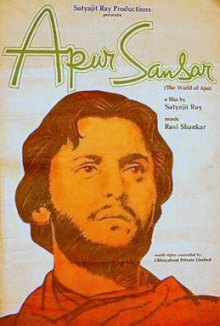With this, we finally close out Satyajit Ray’s Apu Trilogy, having first started it more than two years ago. It’s truly been an epic journey and Ray is undeniably a grandmaster that brings life in early 20th century India to life on the silver screen. Pretty every frame of it is so perfectly composed. That said, it’s disheartening how Apu’s life is a seemingly endless litany of miseries. After having lost everyone in his family, Apu finds happiness here only have it snatched away again. I get it, it’s a testament about the fragility of the lives of the poor but give the guy a break already!
The young adult Apu is forced to leave school at an intermediate level as he has run out of money. He lives in a small room in Calcutta and struggles to pay the rent with his tutoring jobs. He is good enough of a writer to have his stories published in magazines and dreams of eventually completing a semi-autobiographical novel. One day his friend from school Pulu tracks him down, wondering why he had left school. Pulu is from a well to do family and persuades Apu to take a break by attending the marriage of his cousin Aparna in the countryside. However when the groom arrives in a carriage, he is revealed to be mentally unstable and the marriage is cancelled. Aparna’s parents despair as according to their beliefs if she is not married at the appointed auspicious hour, she will never be married. Pulu talks the reluctant Apu into marrying Aparna instead and the couple returns to the small room in Calcutta. Bereft of the servants she is used to and forced to live under drastically worse conditions, Aparna despairs in silence. Yet as time passes, love does blossom between the two.
If you felt that after all that he had been through in the first two films, Apu deserves some good fortune in his life, you’re going to be disappointed. Early on we see that his intelligence and education avail him not at all as he is forced to prematurely end his studies and interview for a series of demeaning and ill paying jobs. The poor state of his clothes and his decrepit lodgings further testify to his poverty. His sudden marriage to Aparna seems like a cosmic joke and it’s difficult for me to believe that there are Indian parents so superstitious that they would accept the first available groom for their daughter regardless of his station in life. That their marriage ends up being a joyful one at least conforms to the laws of drama yet Ray doesn’t let Apu’s happiness last for long. As usual every scene looks amazing. I may not like that the trilogy keeps being about misery piled on top of misery but I can’t deny the director’s mastery of the art of filmmaking. Every image looks so beautiful and you’re effortlessly engrossed in the story.
I don’t need more convincing of how hellish life for the poor is in India so that part of the film is uninteresting to me. What does fascinate me is that it seems to extol a passive acceptance of one’s lot in life. Despite his poverty, Apu never hustles for opportunities to improve his financial status. On the contrary, he is often shown relaxing or sleeping contentedly. His attitude reminds me of that of his own father who similarly accepted the challenges life without attempting to change anything. I’m downright flabbergasted that Apu even leaves behind his dreams of being a writer, a sacrifice that is completely at odds with Western artistic ideals. I’m tempted to say that this is in keeping with Hindu beliefs but I obviously am not an authority on the subject. I do find it doubly depressing that not only do Apu’s miseries continue in this film, he seems to be meant to accept that this is what life is like, just as it was for his father before him.
This means that I’m of two minds about this film. On one level, it’s an absolute masterpiece of pure filmmaking due to its level of craftsmanship. But on another level, it’s yet more poverty porn and I think Ray already did that better in the previous two films. The difference here is the romance between Apu and Aparna but their time together is so short that it feels almost like cheating, just another hammer to bludgeon Apu with. Even so, I’m very glad I’ve finally finished watching all three parts of the trilogy. It’ll never be among my personal favorites but it should be considered obligatory watching to anyone who wants insight into the Indian mindset and Indian cinema.
